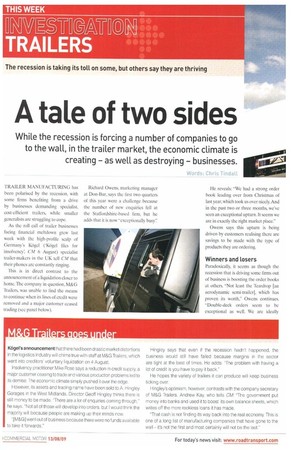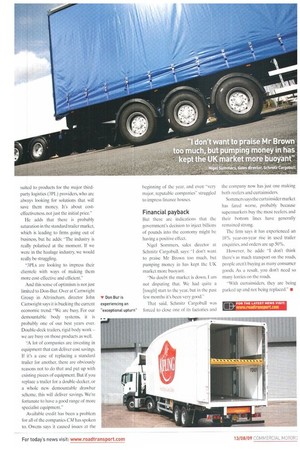A tale of two sides
Page 20

Page 21

If you've noticed an error in this article please click here to report it so we can fix it.
While the recession is forcing a number of companies to go to the wall, in the trailer market, the economic climate is
creating as well as destroying businesses. 001,-31
'I'RAILER MANUFACTURING has been polarised by the recession, with some firms benefiting from a drive by businesses demanding specialist, cost-efficient trailers, while smaller generalists are struggling to cope.
As the roll call of trailer businesses facing financial meltdown grew last week with the high-profile scalp of Germany's Kogel ('KEigel files for insolvency', CM 6 August) specialist trailer-makers in the UK tell CM that their phones are constantly ringing.
This is in direct contrast to the announcement of a liquidation closer to home. The company in question, M&G Trailers, was unable to find the means to continue when its lines of credit were removed and a major customer ceased trading (see panel below). Richard Owens, marketing manager at Don-Bur, says the first two quarters of this year were a challenge because the number of new enquiries fell at the Staffordshire-based firm, but he adds that it is now "exceptionally busy': He reveals; "We had a strong order book leading over from Christmas of last year, which took us over nicely. And in the past two or three months, we've seen an exceptional upturn. It seems we are in exactly the right market place."
Owens says this upturn is being driven by customers realising there are savings to be made with the type of products they are ordering.
Winners and losers
Paradoxically, it seems as though the recession that is driving some firms out of business is boosting the order books at others, "Not least the Teardrop [an aerodynamic semi-trailer], which has proven its worth," Owens continues. "Double-deck orders seem to be exceptional as well. We are ideally
suited to products for the major thirdparty logistics (3PL) providers, who are always looking for solutions that will save them money. It's about costeffectiveness, not just the initial price.
lie adds that there is probably saturation in the standard trailer market, which is leading to firms going out of business, but he adds: -The industry is really polarised at the moment. If we were in the haulage industry, we would really be struggling.
"3PLs are looking to impress their clientele with ways of making them more cost-effective and efficient."
And this sense of optimism is not just limited to Don-Bur. Over at Cartwright Group in A Itrincham, director John Cartwright says it is bucking the current economic trend: "We are busy. For our demountable body systems, it is probably one of our best years ever. Double-deck trailers, rigid body work we are busy on those products as well.
"A lot of companies are investing in equipment that can deliver cost savings. If it's a case of replacing a standard trailer for another, there are obviously reasons not to do that and put up with existing pieces of equipment. But if you replace a trailer for a double-decker, or a whole new demountable drawbar scheme, this will deliver savings. We're fortunate to have a Rood range of more specialist equipment."
Available credit has been a problem for all of the companies CM has spoken to. Owens says it caused issues at the beginning of the year, and even "very major, reputable companies" struggled to impress finance houses.
Financial payback
But there are indications that the government's decision to inject billions of pounds into the economy might be having a positive effect.
Nigel Sommers, sales director at Schmitz Cargobull, says: "I don't want to praise Mr Brown too much, but pumping money in has kept the UK market more buoyant.
"No doubt the market is down. I am not disputing that. We had quite a [tough] start to the year, but in the past few months it's been very good."
That said. Schmitz Cargobull was forced to close one of its factories and the company now has just one making both reefers and curtainsiders.
Sommers says the curtainsi der market has fared worse, probably because supermarkets buy the most reefers, and their bottom lines have generally remained strong.
The firm says it has experienced an 18% year-on-year rise in used trailer enquiries, and orders are up 50%.
However, he adds: "I don't think there's as much transport on the roads, people aren't buying as many consumer goods. As a result, you don't need so many lorries on the roads.
"With curtainsiders. they are being parked up and not being replaced," •












































































































































